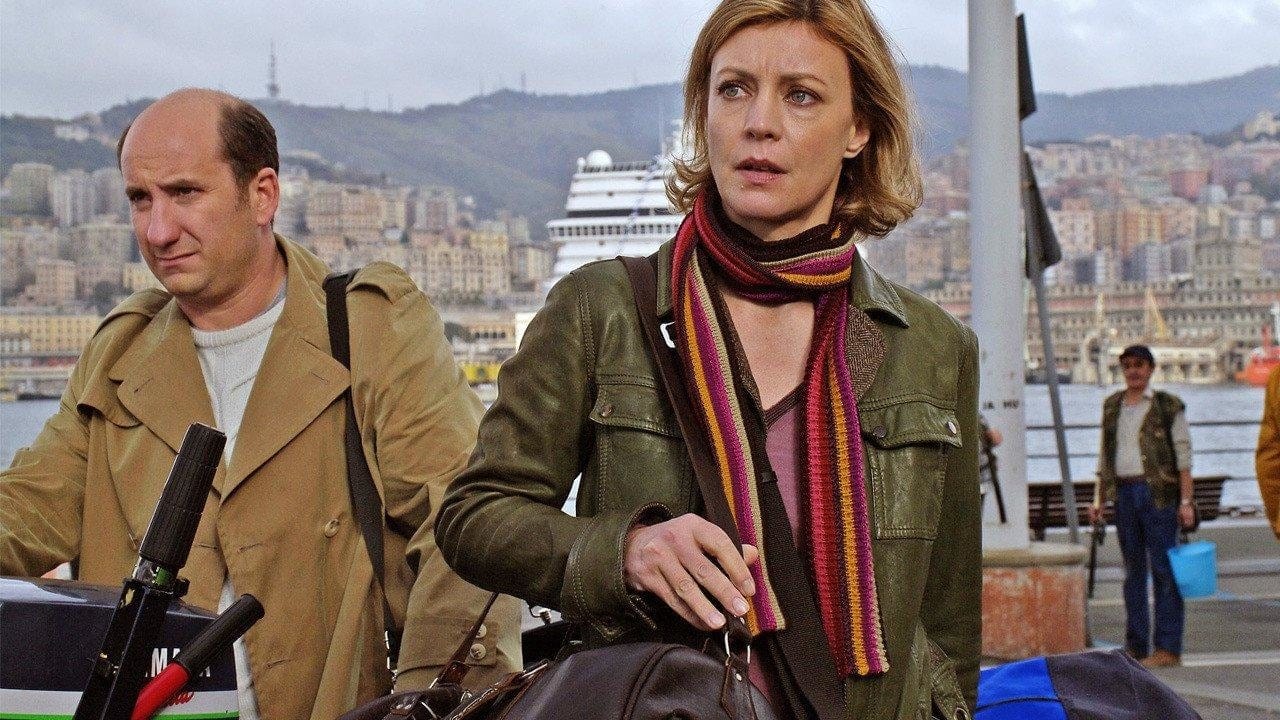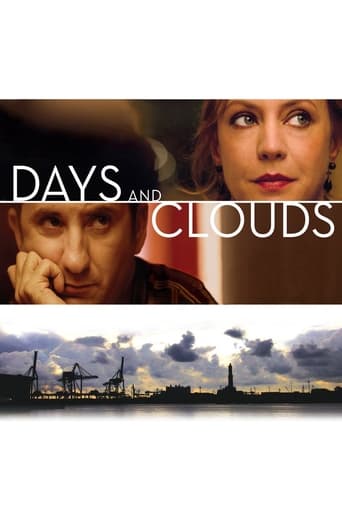

After three movies that elevated him from d'essai circuits in terms of box office results, director Silvio Soldini returns to more dramatic and current themes closer to his debuts. Middle-class families can't afford financial problems, that's seems to be the sense of the movie. Step after step all certainties and habits of a Genova's well off family, crawl down after Michele (Antonio Albanese) lost his work. Soldini as always, has the sensibility and the touch to treat such difficult material, but nevertheless the script (of the same author with Tiziana Leondeff) never reach the audience. The story advances laboriously, the non-core characters are just sketched and stereotyped, and most of all the main character, Antonio Albanese, not has the necessary depth, his Michele seems a man who could not accept the consequences of his actions, ever astonished by the behavior of the rest of human race, including members of his family. Early the movie slips toward a foreseeable descent, tell the truth, in the end there's a bit of relief. Great waste of talent for the performance of Margherita Buy, as always measured and effective. Awful soundtrack, by the way.
... View MoreTimes are tough right now, mirroring the era of The Great Depression. Financial security is a ghost, friendships and relationships are tested by walking the razor edge of insolvency, and according to the 'popular movie' polls the escape for many is in the darkened movie houses with comic hero or animal animated mindless safety net entertainment. Not so with the very brilliant film DAYS AND CLOUDS written (with Doriana Leondeff, Francesco Piccolo, and Federica Pontremoli) and directed with immaculate attention to detail by Silvio Soldini (BREAD AND TULIPS, etc). Soldini recreates the global financial nightmare in the form of an examination of one family's fracture and consequences. It resonates despite the depressing story, offering a glimpse into the universal ties that bind us at this moment. Elsa (Margherita Buy) is graduating from Art History and Restoration school and seems to be a woman on top of her league, complete with surprise gifts and a celebration staged by her husband Michele (Antonio Albanese). Waking up the morning after her congratulations party, Elsa is ill with a hangover, but even more shocked when Michele breaks the news to her that he has been out of work for two months, ashamed that he has lost his company and his job, hiding in the couple's boat during the day. There is no money left and the couple must face losing their home and are forced to take on menial tasks to survive. Pride prevents the couple from sharing their financial downfall with friends and with their one child - Alice (Alba Rohrwacher) who has elected not to pursue education in favor of waiting tables in a restaurant she has invested in with friends. The tension of keeping the secret to themselves causes mounting friction between the couple and events that would have never happened had they shared their misfortune with friends and family bring their relationship to a near fatal end. How they survive is touched, quietly and quickly and gently, at film's end. Soldini spares no pain in the responses of his characters' misfortune, but at the same time he allows each character to emerge from ideal married tropes to completely human victims of financial ruin. Buy and Albanese are triumphant in their performances as the married couple caught in the crumble of decline. But there are fine performances by Rohrwacher and Fabio Troiano as her lover Riki, and Carla Signoris as Elsa's closest friend Nadia, and actors playing two ex-employees of Michele who provide a window of friendship in Michele's time of desperate need. The cinematography by Ramiro Cirita and the musical score blending opera and folk music by Giovanni Venosta enhance the motion of the film that though just under two hours in length, appears more succinct. Silvio Soldini has taken a topic that affects us all and polished into a film that is bound to touch every viewer deeply. Highly recommended movie from The Film Movement. Grady Harp
... View MoreIn this film about work and marriage by 'Bread and Tulips'director Silvio Soldini, a well-off Genoa couple has to face self-image, marriage, and work problems when their financial world crumbles. Right after Elsa (Margherita Buy of The Unknown Woman) passes her graduate exams in art history and her husband and friends give her a big surprise party to celebrate, the truth comes out. Michele (Antonio Albanese) reluctantly reveals to his wife that due to hard times, corporate restructuring, and his own stubbornness he's been pushed out of the firm he co-founded with Roberto (Alberto Giusta) and hasn't been working or receiving a salary for months. They're in debt. Everything has to change now.First off Elsa is furious at Michele for not telling her all this sooner. His judgment was that knowing would have made it hard for her to finish her graduate work, but now that she has to know, it angers her to have been lied to. Probably he was lying to himself, but he's forgotten that marriage is a partnership.Neither Elsa nor Michele knows how to adjust. One night they go out to dinner with friends and Michele insists on paying, even though the bill is over $300. Again Elsa is furious. Later, she finds it impossible to speak frankly to her best friend, Nadia (Carla Signoris). It pains her to confront people now that one by one their status symbols are being removed. In the face of loss, there's the typical denial. Everything seems shaky.Whether they're getting along or not, their beautiful apartment must be sold. Their maid, Daisy, must go to take a full time job, and they have to sell something to raise the money for her severance pay. Elsa has to give up her art restoration project--which was an adjunct to her graduate work and her passion but was unsalaried--and find a part-time job in telemarketing and in the evenings fill in as secretary to a shipping company boss. They haven't told their grown daughter Alice (Alba Rohrwacher) about any of this. Relations with Alice are painful because Michele doesn't approve of Ricky (Fabio Troiano), the boyfriend she lives with. Later he is to get down off his high horse when he learns Ricky's not such a bad guy. For now, they haven't told Alice.Michele looks for work, but has a hard time accepting offers that are, inevitably, all below what he's been used to. (This is another form of denial.) One day he's desperate to do something, anything. He takes a day job through an employment office delivering packages on a motorbike--and Alice sees him. So she finds out. Alice has previously used the money her parents had given her for university to open a restaurant. It's doing fine, and she works there. Alice is torn between anger at Michele and serious concern for her parents.Michele has failed to take what turns out to be the best offer he's going to get, so he falls into something utterly humble but somehow satisfying, because it's physical. He does minor rehab work with two of his former employees, Vito (Giuseppe Battiston) and Luciano (Antonio Carlo Francini), who were let go by his firm before he was. Signor Salviati (Paolo Sassanelli), the shipping boss Elsa secretaries for in the evenings, has a weakness for her and keeps flirting. His attentions are all the more tempting with things so rocky in her marriage, but she still resists--mostly. Michele gets increasingly depressed when Vito and Luciano get hired back in the shipping industry and he can't finish their rehab jobs on his own and no longer has their company. Now he doesn't even go to interviews and he has nothing to do but mope.This little Italian film's hard lesson--that economic disaster can happen to anybody--comes at all too good a time for an American audience. The question the film subliminally asks is to what extent relationships, sense of self, and peace of mind may all rest on a lifestyle--how much economic security or its absence can change everything. Now that Elsa and Michele's "days" are full of "clouds" and their nerves are on edge (and Elsa is exhausted from her new make-do jobs), they get into fights easily. It's not certain their marriage will survive. After a fight, Michele sleeps over one night with Ricky and Alice. This is when he sees that Ricky's a good guy. It's also clear now they're lucky Alice has made herself financially independent.Elsa's restoration project, which we see her presenting during the opening credits, involves unearthing a fresco that may be the work of an early renaissance painter she's interested in. Toward the end of the film, she returns to the project and finds that her intuitions were correct. She's vindicated, her professor is admiring, and this becomes a metaphor for discovering a future. In the final scene, Elsa and Michele agree to forget the past and move forward as best they can. Their losses have taken them back to basics and to honesty with each other and their daughter.While this starts with a premise like that of Laurent Cantet's 'Time Out' of a man hiding that he's been pushed out of the corporate world, the development here is much more practical and everyday. The film succeeds because of a lack of tricky plot developments, and the charisma and polish of Buy and Albanese. Soldini does a splendid job of evoking the upper-middle-class lifestyle the couple lives in Genoa. Events are nerve-wracking because they're living so much on the edge. This is probably a more common situation than it used to be. It's not very hard to identify with the couple and feel the day-to-day insecurity they suddenly live with. The security blanket is easily ripped. In a world of globalization and ever more rapacious capitalism, the upper bourgeoisie is yet another new proletariat, and 'Days and Clouds' is a sympathetic portrayal of what that may mean.
... View MoreA great follow up to Bread and Tulips, this story focuses on the other end of the spectrum of a relationship. As the movie progresses and the situation of the characters worsens, you begin to see subtle changes in the manner the couple interacts with each other, kudos to the fine actors for portraying such intimate and fragile emotions so realistically.Does love conquer all? Silvio Soldini (who was present after the world premiere of this in Toronto to comment on this question) isn't sure if it does, but he's hopeful. Decide for yourself and watch this film as he takes you on a journey of the highs and lows of a middle-aged relationship.
... View More